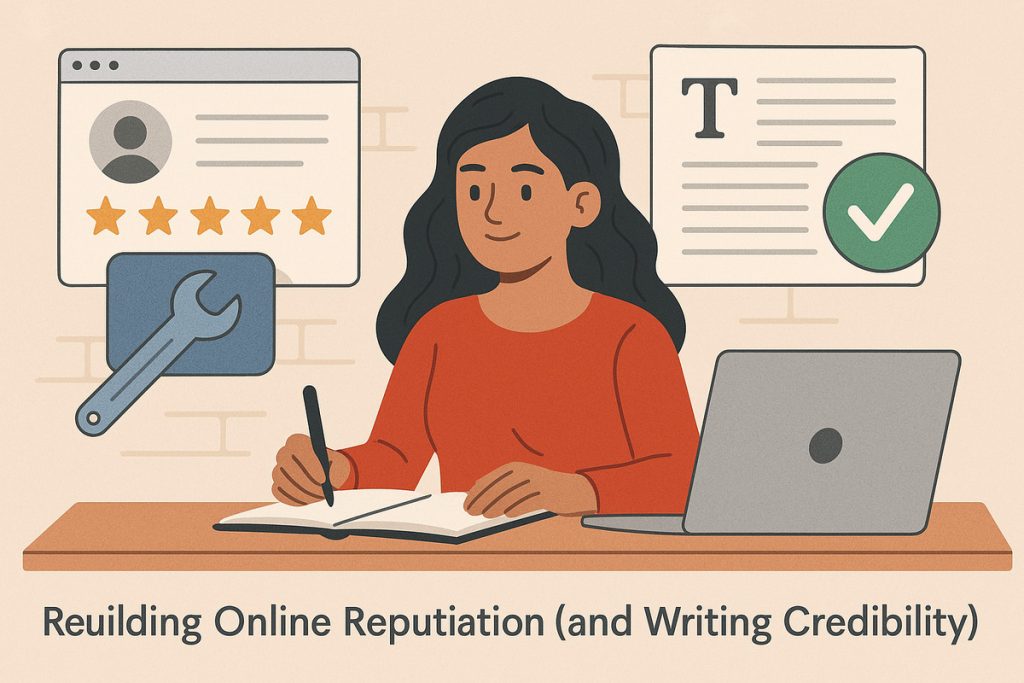When your name shows up in court records, Google doesn’t forget. Whether you were the one who filed the lawsuit or were named in one, the online fallout can stick around long after the case is closed.
If you’re a writer, blogger, editor, or run a content-driven brand, your credibility is everything. Search results matter. So do reviews, articles, and old headlines that won’t go away. Even if you’ve done nothing wrong, the internet may think otherwise.
Here’s how to clean things up, control the narrative, and get back to focusing on what you do best—writing great content and staying productive.
Why Reputation Matters for Writers and Content Creators
If your work depends on trust, visibility, and authority, your online image isn’t optional. Readers, clients, publishers, and even sponsors will search your name before saying yes to anything.
According to a 2023 survey by TrustRadius, 81% of people Google a name before responding to a pitch or hiring someone. For writers and creators, that means you’re being judged before they read a single word.
One freelance journalist I spoke to lost a contract with a travel site after an old legal dispute popped up on page one of Google. It had nothing to do with their writing. But it still raised red flags for the editor. That’s how fast a reputation issue can shut down opportunity.
Step 1: Find Out What’s Online About You
You can’t fix what you can’t see. So start with a self-audit.
Google your name in incognito mode
Use private browsing so your search history doesn’t change what you see. Search:
- Your full name
- Your business or blog name
- Your name + lawsuit
- Your name + court
- Your name + “scam” or “complaint”
Take screenshots of everything on page one. Track what’s old, what’s false, and what you don’t control.
Set up alerts
Use Google Alerts to get notified anytime your name shows up in a new post, comment, or article. It’s free and takes two minutes.
You can also try tools like Mention or Brand24 if you want deeper tracking.
Step 2: Respond Strategically
Don’t try to fight everything. Focus on what you can change or replace.
If something is factually wrong
File a removal request. Many news sites, forums, and court databases will consider edits or removals if content is inaccurate, outdated, or legally resolved.
You can also use Google’s outdated content removal tool if the page no longer exists but still appears in search.
If the content is harmful but won’t come down, it might be time to hire professionals. Some online reputation management services specialize in pushing down legal content and court listings in search results.
If the content is true but unflattering
You still have options. You can’t erase it, but you can outrank it.
That’s where fresh, relevant content comes in.
Step 3: Publish Your Own Content—A Lot of It
The fastest way to push down bad results is to create better ones.
Start with your personal website
If you don’t have one yet, build it. Use your real name in the domain if possible. That makes it easier for Google to connect it to you.
Fill it with:
- A short bio
- Writing samples
- Project pages
- Testimonials
- A blog with updates or thoughts on your niche
One freelance editor I worked with started a Substack newsletter and posted weekly. Within six weeks, their new content outranked a six-year-old court link on page one.
Use platforms that Google trusts
Post to:
- Medium
- Quora
- YouTube (even short, low-effort videos count)
- Reddit (join writing or productivity threads)
Each of these platforms has strong search power. If your name is attached to helpful content, it will rise up over time.
Step 4: Show You’re Active and Trusted
Reputation is about visibility, but it’s also about consistency.
Get reviews and endorsements
Ask past clients, editors, or collaborators to leave public reviews. Use LinkedIn or Google Business if you run a service.
Even a short “Working with [Your Name] was smooth, fast, and fun” builds trust. Especially if you’ve had negative content linked to your name before.
Get quoted in articles
Use platforms like Help A Reporter Out (HARO) or Qwoted to get featured as a source in news stories. It takes 5 minutes a day and helps build authority in your field.
Writers, marketers, and even book reviewers do this to boost their presence and drown out old noise.
Step 5: Keep Writing (But With a Purpose)
You don’t need to write about the lawsuit. But you do need to keep writing.
Focus on high-ranking keywords
If you’re a travel blogger, write about trending places and include your name in the author byline. If you run a productivity site, create tutorials, listicles, or comparison guides.
Use a word count tool to optimise your posts for size and clarity. Longer posts (1,000+ words) tend to rank higher, especially if they’re structured with clear headings.
Post regularly
Set a schedule—once a week or twice a month. Keep showing up. Google loves fresh content. And so do readers.
Step 6: Control the Conversation (Don’t Ignore It)
If people ask about the lawsuit directly, don’t pretend it didn’t happen. Keep your answer short and calm.
Here’s a sample:
“That issue was resolved, and I’ve since focused on my work in writing and content strategy. I believe in letting the results speak for themselves.”
The goal is to show that you’re not hiding—you’ve moved forward.
Final Thoughts
A lawsuit doesn’t define your writing career. But how you respond to it does.
Own your name. Post content that reflects who you are today. Use tools and platforms that push old news down where it belongs. And if needed, lean on trusted online reputation management services to help speed up the process.
Reputation recovery isn’t fast. But with the right strategy—and solid writing—it works.
Stay visible. Stay consistent. Keep publishing.

